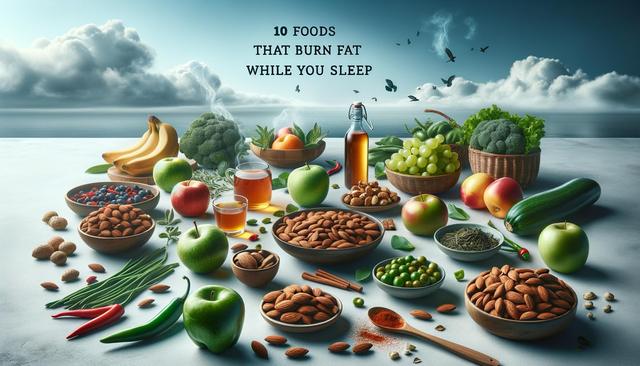Why Nighttime Fat Burning Matters
Many people focus on diet and exercise during the day, but the hours spent sleeping can also play a role in supporting metabolic health. While it’s not a magic solution, your body continues to burn energy at rest, and certain foods may help promote this natural process. Including specific ingredients in your evening routine may support fat oxidation, hormone balance, and a healthy metabolism. The idea of “Burn Fat in Your Sleep? Yes, Really” may sound surprising, but it’s rooted in how the body functions overnight. When you give your body the right fuel before bed, you’re setting the stage for more efficient overnight repair, digestion, and calorie processing.
At night, your metabolism doesn’t shut down—it simply shifts focus. Hormones like melatonin, insulin, and growth hormone play a role in how energy is used and stored. Some foods may work in harmony with these processes, offering gentle support to fat-burning mechanisms. Rather than skipping meals or eating heavy, high-calorie snacks, choosing nutrient-dense options can make a difference in how your body works for you overnight.
The Fat-Burning Food Countdown
Let’s explore 10 surprising foods that may support metabolism while you sleep:
- Greek yogurt: A source of casein protein, which digests slowly and may help preserve muscle mass during the night.
- Almonds: Rich in magnesium and healthy fats, they may support blood sugar balance and overnight metabolism.
- Chia seeds: High in fiber and omega-3s, they may promote satiety and improve fat processing.
- Turkey slices: Contain tryptophan, which supports sleep and helps regulate appetite hormones.
- Kiwi: Offers antioxidants and serotonin precursors that promote better sleep and metabolic health.
- Cottage cheese: Another slow-digesting protein that helps muscle repair and may reduce nighttime hunger.
- Bananas: Contain potassium and magnesium, which may support muscle relaxation and sleep quality.
- Oats: Provide complex carbs that encourage serotonin production and may help regulate insulin levels.
- Herbal tea (like chamomile or peppermint): Zero-calorie and soothing, it may support digestion and restful sleep.
- Avocado: Packed with healthy fats and fiber, it may aid in nutrient absorption and reduce cravings overnight.
These additions can be part of a thoughtful nighttime snack. Consider pairing them with calming evening habits like stretching or reading to create a full wellness routine.
What to Combine These Foods With for Maximum Effect
While these foods on their own offer benefits, combining them with other mindful habits can enhance their impact. For example, eating a small portion of protein-rich food 30 to 60 minutes before bed, accompanied by a calming non-caffeinated beverage, may improve your body’s ability to repair and burn energy efficiently overnight.
To make the most of these foods, consider the following combinations:
- Pair almonds with a piece of fruit for a fiber and fat balance.
- Mix chia seeds into a small bowl of Greek yogurt for added protein and omega-3s.
- Top oats with banana slices and cinnamon for a naturally sweet, metabolism-friendly snack.
Hydration also plays a role. Drinking enough water throughout the day, and perhaps finishing with a cup of herbal tea, can support digestion and prevent nighttime cravings. Gentle movement after dinner—like a short walk or light stretching—can help with digestion and further assist your metabolism before sleep.
Consistency is key. Including these foods regularly in your routine may yield better long-term results than drastic changes. Understanding “What to Combine These Foods With for Maximum Effect” is about creating a sustainable pattern that supports your nighttime health goals.
Real Stories: People Who Tried These Foods and Noticed a Difference
Many individuals have shared their experiences of integrating these foods into their evening habits and noticing subtle but meaningful changes. While outcomes vary, some common themes emerge, such as improved sleep quality, reduced late-night cravings, and a sense of waking up with more energy. These anecdotal observations, while not scientifically definitive, highlight the potential of a supportive nighttime food strategy.
For instance:
- One individual swapped out sugary desserts for cottage cheese with berries and reported feeling more satisfied and less bloated in the morning.
- Another included a banana and almond butter snack before bed and noticed fewer nighttime awakenings and better morning energy.
- Someone added chamomile tea and kiwi to their evening routine and described deeper sleep and a flatter stomach over time.
These “Real Stories: People Who Tried These Foods and Noticed a Difference” demonstrate how small changes can create momentum. While not everyone will experience the same results, experimenting with different combinations can help identify what works best for your body and preferences.
Creating a Balanced Night Routine
Including fat-burning foods in your nighttime routine is just one piece of the wellness puzzle. A balanced approach includes not only what you eat but also how you sleep, move, and manage stress. Food can play a supportive role, but it works best when combined with good sleep hygiene and consistent daily habits.
Here are a few tips to round out your routine:
- Stick to a regular sleep schedule to support your circadian rhythm.
- Avoid screens at least 30 minutes before bed to encourage melatonin production.
- Choose whole, minimally processed foods throughout the day to support overall metabolic health.
If you’re focusing on “Burn Fat in Your Sleep? Yes, Really,” remember that it’s not about quick fixes. It’s about creating a system that supports your body’s natural rhythms. These food options are tools that, when used consistently, may help you feel better, sleep more soundly, and wake up with a sense of balance.
Conclusion: Fuel Your Night, Support Your Goals
Integrating foods that gently support nighttime metabolism can be a practical addition to your overall health strategy. While they’re not miracle solutions, including these options as part of your evening routine may help promote better sleep, sustained energy, and long-term wellness. By understanding “Why Nighttime Fat Burning Matters” and considering “The Fat-Burning Food Countdown,” you’re equipping yourself with knowledge to support your goals thoughtfully. Remember, it’s all about balance, consistency, and listening to your body. Whether you’re adjusting your evening snack or fine-tuning your nightly habits, these small steps can contribute to a healthier, more energized you.









